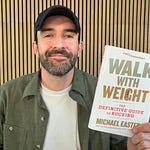Post summary
We’re speaking to Henry Shukman, one of my favorite thinkers and practitioners in the meditation and mindfulness space.
Meditation can be a great tool for the mind and body and living better every moment.
But as it’s gone mainstream, it’s been reduced to another health hack. It’s been stripped of its original intent and transformative power.
Meditation isn’t a form of self-help, stress reduction, productivity, and relaxation (even though it might do all of those things for you).
It’s a path to insight into the nature of consciousness. It can help us break the automatic and unconscious thoughts and stories our brains spin up—and that “rewiring” is where the magic happens.
Watch the video above or listen to the audio below.
I’ve also included show notes and a transcript for the readers out there.
Housekeeping
This post, like all Monday posts, is free to all subscribers.
But only Members get full access to all three weekly Two Percent posts. Become a Member to get health and mindset information that cuts through the noise:
ICYMI:
On Wednesday, we covered a research-backed mental toughness tool. It works. Use it. Share it. Be more resilient.
On Friday, we ran a Burn the Ships workout that leans into the most fundamental human movement: carrying weight.
Shoutout to our partners:
Function Health offers 5x more testing than typical blood work. I’ll be fascinated to see how my bloodwork changed before and after my 850-mile hike. Function now also tests for “forever chemicals" (PFAS)—potentially harmful substances found in nonstick cookware, food packaging, and even drinking water.
Maui Nui Venison harvests the healthiest meat on planet Earth. 100% wild, ethically-harvested, and delicious. Maui Nui is offering Two Percent readers a limited collection of my favorite cuts and products, like the Peppered 10 jerky stick. Supply is limited because axis deer are wild. Head to mauinuivenison.com/EASTER to secure access.
Momentous made me feel good about supplements again. They’re researched back and tested for purity because Momentous has contracts with most pro sports leagues and the US Military. My picks: Essential Plant Protein + Daily Multivitamin. Use discount code EASTER for 15% off.
Audio version
Listen in the audio bar below:
The post
When I was getting sober over a decade ago, my mind was, as I wrote in The Comfort Crisis:
… like a hard rubber ball shot from a cannon into a concrete room. It existed in a high-grade state of mania and bounced from joy that I was alive, to depression that I got here, to terrifying question after terrifying question about my new way of life. How do I not drink? What do I do on weekends? What should I say if I’m at a social event and someone asks me if I want a drink? How will I reconnect with my old friends at college reunions and weddings?
A friend told me meditation might help. So I sat down and tried it.
I expected to dissolve into a blissed-out state. But what happened was more the psychological version of a 15-car pile-up—if anything, my manic thoughts accelerated and collided into chaos.
Despite the discomfort, I tried it the next day … and the next day … and the discomfort eventually brought insight.
Like many people, I came to meditation with a goal, but as I delved deeper into the practice, I discovered teachers who made me think differently and helped me gain better realizations about the nature of consciousness.
Henry Shukman was one of those teachers. He’s since become my go-to thinker in the meditation space.
Henry is a meditation teacher in the Sanbo Zen lineage and the Spiritual Director Emeritus of Mountain Cloud Zen Center in Santa Fe, New Mexico. He’s taught meditation at Harvard, Google, and other notable institutions.
He founded The Way meditation app.
He’s also a poet and the author of Original Love (his most recent book, covering spirituality broadly) and One Blade of Grass (his personal story).
In our conversation, Henry described meditation as “a prime laboratory for for testing and increasing our capacity for discomfort.”
Here’s what we covered in our conversation:
1. Henry’s path to meditation
Henry had a formative mystical experience at age 19, while staring out at the Pacific Ocean. He felt utterly connected to the universe.
It made him realize we are not separate from reality and that life-shifting moments can happen unexpectedly.
Integrating those moments, however, often takes a lifetime of practice.
2. Problems with making meditation "productive"
Meditation is often marketed as a tool for stress relief or professional success. Meditators often get those benefits, but they miss the point.
Henry explains why treating meditation like a performance metric or optimization strategy might actually hinder deeper growth.
“It’s a path from separateness to interconnectedness,” Henry explained.
3. Why meditation is (and should be) uncomfortable
Our mind is like a radio on seek, compulsively scanning from one thought to the next: “Did I leave the oven on?” “Does my neighbor make more money than me?” “Did that new show get released on Netflix?”
Meditation helps us notice the noise, but integrating its lessons into our lives is a challenge. It’s also essential—and it can radically improve our wellbeing.
“Meditation grows our capacity to sit with discomfort,” said Henry.
4. Personality types and meditation
Henry said certain personality types may be better suited to meditation.
Running may help meditation.
Why people with busy jobs often struggle with meditation.
5. The concept of “no self” and flow
The concept “no self” is related to flow, and meditation can prime us to drop into flow states.
We’re wired to search for problems, and meditation can cut through that. “No self, no problems.”
Henry explains that there are various levels of flow—the flow state as we’ve traditionally thought of it and a realm out beyond flow that is deeper and more life-changing.
He reveals how you can leverage flow to get into the deeper realm.
“Flow is when the problem-solving self quiets down. That’s why it feels so good,” Henry said.
6. The path to awakening
How meditation helped my anxiety around public speaking.
Why we should think of meditation as long-term psychic remodeling, not a daily escape. The shifts take time.
Meditation is about gradually seeing through the illusion of a solid, separate self.
Henry explained, “Most people start by noticing thoughts. Eventually, they start noticing that the thinker isn’t so solid either.”
Why Henry created The Way and how it’s unique among meditation apps. “If you know you have to follow a path and you know it’s going somewhere, that incentivizes you.”
7. Zen, koans, and beginner’s mind
How Zen is different from other practices and why it suited Henry.
Koans—mysterious Zen phrases/poems like “rice in the bowl, water in the pail”—are experiences to sit with, to feel. They often don’t make any sense—until they do. And when they do, change happens.
How to work through Koans.
The concept of “beginner’s mind,” an open, non-judgmental approach to experience.
Henry believes “Poetry is words from a wordless place that call us back to the wordless.”
8. Evolutionary reasons why mindfulness is challenging
Henry speculates, and I agree with him, that we evolved to not be present in order to survive.
I.e., In the past, people who constantly ran scenarios in their head about what happened in the past and what might happen in the future likely had a survival advantage.
9. How to start meditating
Henry recommends two entry points:
Use a structured app like The Way (which he co-created and I love).
Visit a local meditation center for in-person instruction.
Practice daily—even if messy, even if briefly. That’s the most reliable route to long-term change.
On Wednesday, we’ll look at various non-traditional ways to “meditate.”
Resources Mentioned:
The Way App: Guided meditation with a structured daily path. I love this app because it removes options and puts you on the most insightful journey.
One Blade of Grass, a memoir about Henry’s awakening and Zen journey
Original Love, Henry’s latest book, a spiritual handbook to ease troubles and find the highest possible happiness.
Why Meditate by Matthieu Ricard, a practical guide from a person known as the “happiest man alive”
Transcript
Have fun, don’t die, think … think … think …
-Michael
P.S., I know Henry’s practice works because we faced a million tech problems while recording this conversation and he remained relaxed and hilarious throughout.









